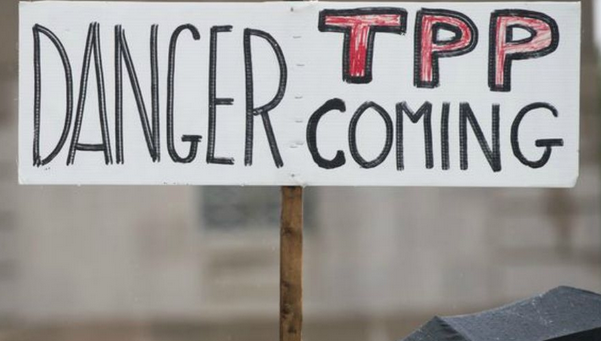

Share
With the announcement Monday that the United States and 11 other Pacific Rim countries have reached agreement on the Trans Pacific Partnership, unions and other fair trade groups vowed to fight the deal as it goes before Congress.
The TPP sets up a free trade zone covering 40 percent of the global economy, but critics say it lacks vital jobs, health, consumer, environmental and other protections. Corporations had access to the negotiations, which were conducted in secret. Most citizens, including their elected representatives, have seen only information that leaked from the talks.
The Citizens Trade Campaign, a national coalition of labor, environmental, family farm, consumer and faith organizations working to improve U.S. trade policy, said the TPP “is unlikely to be fair to anyone but CEOs and Wall Street executives.”
CTC Executive Director Arthur Stamoulis said, “Now that a deal has reportedly been agreed upon, Congress should insist that it and the public receive immediate access to any and all TPP text.
“The benchmarks Congress will now have to consider include:
- Does the TPP include labor and environmental standards, rules of origin and currency safeguards strong enough to protect human rights abroad and good-quality jobs here at home — or will the pact ship jobs overseas and reduce wages for American workers?
- Does it establish a floor, rather than a ceiling, when it comes to food and product safety — or will it expand imports from countries where food is often found to contain banned toxic chemicals?
- Does it make medicine more affordable — or will it increase the price of prescription drugs for seniors, veterans and others by enabling big pharmaceutical companies to prevent the sale of life-saving generic medications?
“Leaked texts, and the TPP negotiating process itself, suggest the public is going to be unhappy with the answers to those questions.”
The Citizens Trade Campaign includes the Minnesota Fair Trade Coalition, an organization working in Minnesota to advance fair trade policies.
Leo Girard, president of the United Steelworkers, said, “You only have to look at the consistently dismal job numbers in manufacturing to understand what every manufacturing worker already knows. We have been on the losing end of trade deals.”
Girard called on Congress to reject the TPP as negotiated.
The National Farmers Union blasted the TPP for failing to address a key problem for American family farmers: currency manipulation that other countries use to enhance exports.
“Because of this, NFU will continue to vigorously oppose this agreement and urge Congress to reject this deal as well,” said NFU President Roger Johnson. “Gains that may have been made in the agreement to ensure fairness and equity in trade for America’s family farmers and ranchers are likely to be lost due to currency manipulation.
“Any deal that lacks tough language against currency manipulation is not worth the paper it’s written on.”
Lawmakers in all 12 countries covered by the TPP must approve the free trade agreement for it to take effect. In addition to the United States, those countries are Australia, Brunei, Canada, Chile, Japan, Malaysia, Mexico, New Zealand, Peru, Singapore and Vietnam.

